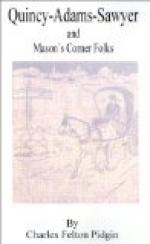All eyes were turned upon Strout, who, seeing that he had nothing to gain by objecting, cried out, “Oh, go ahead; what do I care about such nonsense!”
Tilly then read with much dramatic expression the following poetical effusion:
“How does the wicked
bumblebee
Employ the shining
hours,
In stinging folks that he
dislikes,
Instead of sipping
flowers.”
Another loud laugh greeted this; largely due to the comical expression on Tilly James’s face, which so far upset Quincy’s habitual gravity that he was obliged to smile in spite of himself.
If Strout felt the shot he did not betray it, but turned to Huldy, who stood at his right, and said, “Now, Miss Mason, let me read your poetry for you, as they do it in the city.”
Huldy hesitated, holding the slip of paper between her fingers, “Oh! that ain’t fair,” said Strout. “I’ve set you a good example, now you mustn’t squeal. Come, walk right up to the trough.”
“I’m no pig,” protested Huldy.
As Strout leaned over to take the paper he said in an undertone, “No, you are a little dear;” whereat Huldy’s face flushed a bright crimson.
Strout cleared his voice and then read:
“Come wreathe your face
with smiles, my dear,
A husband you’ll
find within the year.”
This was greeted with laughter, clapping of hands, and cries of “Who is it, Huldy?”
The Professor looked at Huldy inquiringly, but she averted her eyes. He leaned over and said in an undertone, “May I keep this?”
Huldy looked up and said in a tone that was heard by every one at the table, “I don’t care; if you like it better than that one about the bumblebee you can have it.”
The Professor then turned to Quincy and said, “Perhaps Mr. Sawyer will oblige the company by passing his poetry along, as they do it in the city.”
Quincy answered quickly, “Why, certainly,” and handed the slip to his left-hand neighbor, who chanced to be Miss Seraphina Cotton, who was the teacher in the public school located at Mason’s Corner.
She prided herself on her elocutionary ability, and read the following with great expression:
“Though wealth and fame
fall to my lot,
I’d much prefer
a little cot,
In which, apart from
care and strife,
I’d love my children
and my wife.”
Strout laughed outright.
“By the way, Mr. Sawyer,” said he, “have you seen any little cot round here that you’d swap your Beacon Street house for?”
“I’ve got my eye on some real estate in this town,” said Quincy, “and if you own it perhaps we can make a trade.”
’Zekiel Pettengill passed his slip to Lindy Putnam; it ran thus:
“‘An honest man’s
the noblest work of God,’
No nobler lives than
he who tills the sod.”
This was greeted with shouts and cries of “Good for ’Zeke!” while one of Cobb’s twins, who possessed a thin, high voice, cried out, “He’s all wool and a yard wide.”




